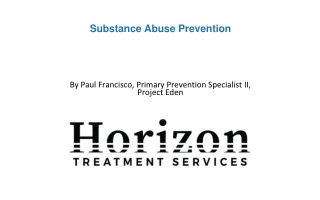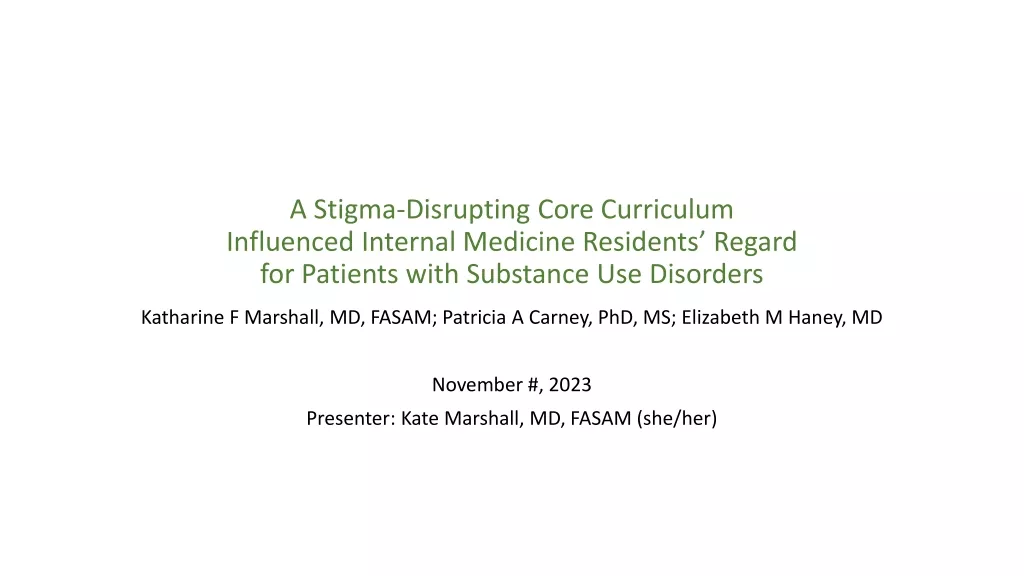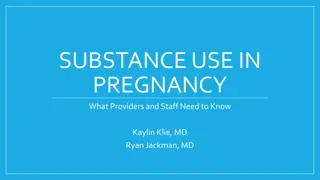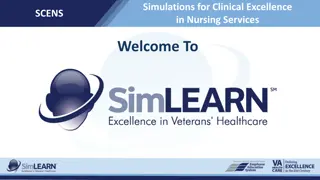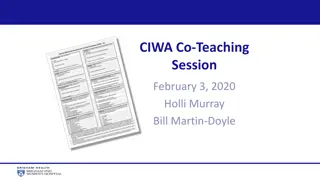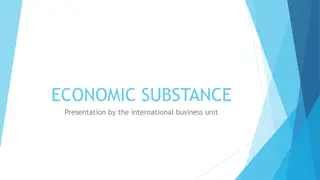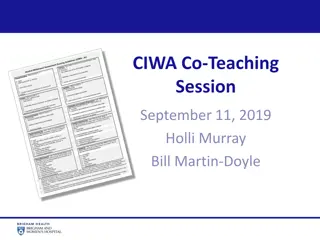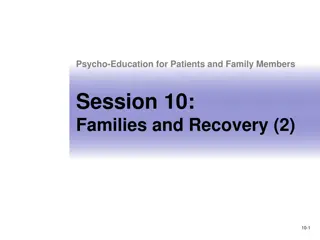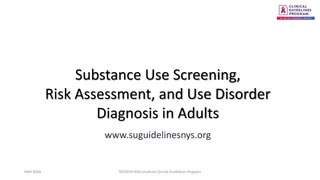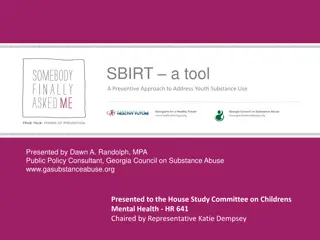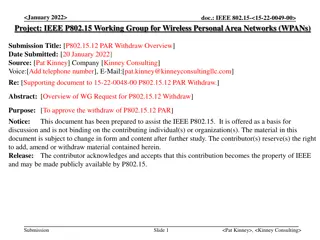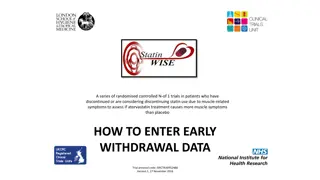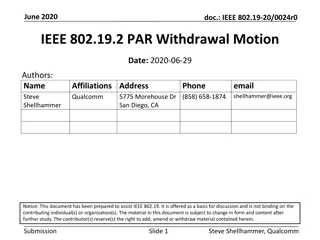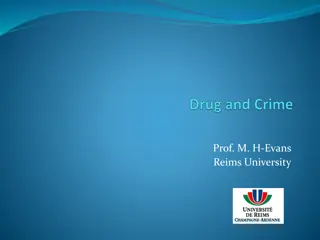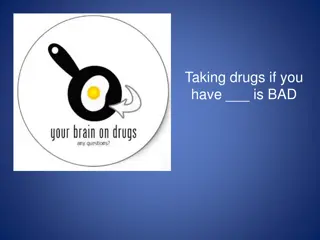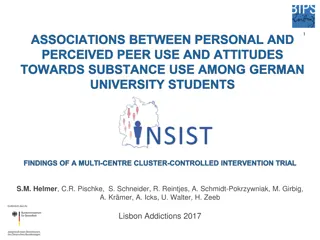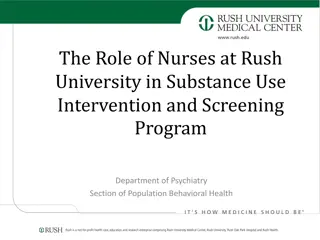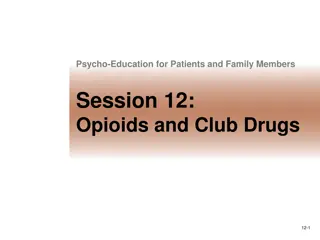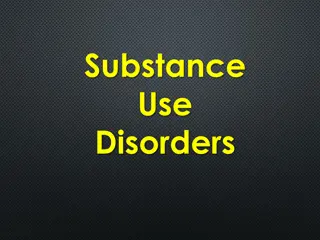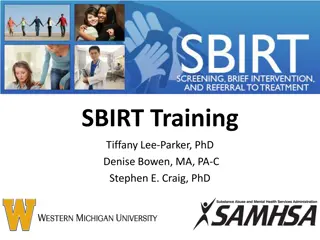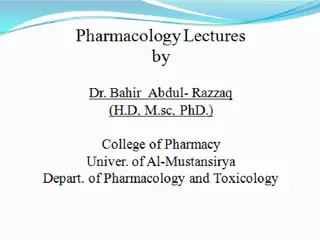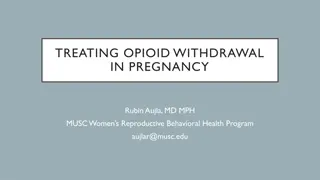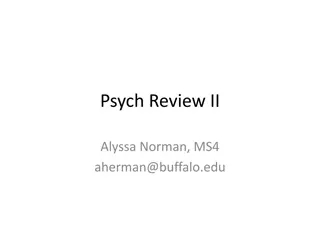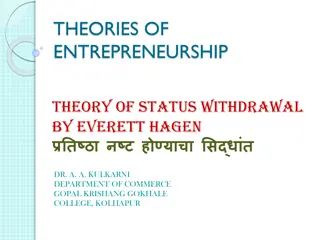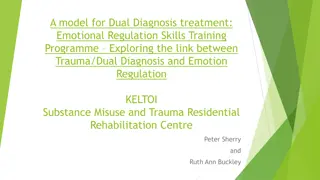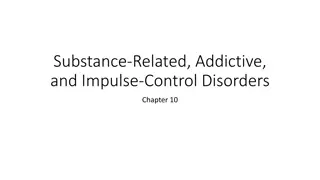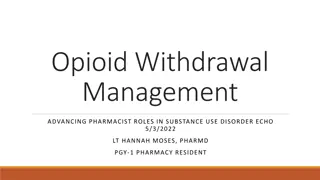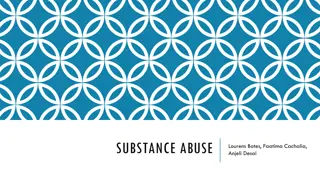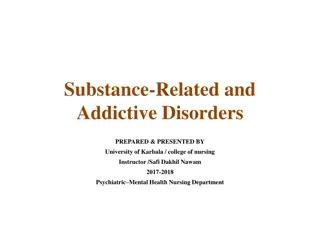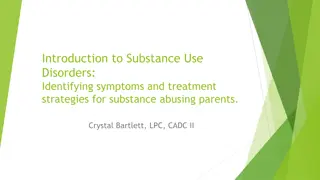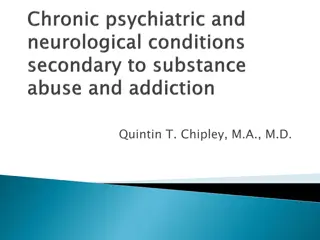Substance Abuse Prevention
Exploring substance abuse prevention strategies by Paul Francisco, a Primary Prevention Specialist. The session covers defining substance abuse, statistics of youth substance use, types of substances used, warning signs for parents, and preventative measures. Learn about the harmful effects of vapin
0 views • 42 slides
Drug-Free Workplace Training Overview
This drug-free workplace training provides essential knowledge for supervisors in identifying and responding to substance misuse among employees. It covers statistics on substance use disorders, the benefits of a drug-free workplace, relevant federal laws, warning signs of substance misuse, and the
2 views • 27 slides
Enhancing Internal Medicine Residents' Approach to Patients with Substance Use Disorders
This study focuses on developing and implementing a stigma-disrupting curriculum to improve internal medicine residents' attitudes and knowledge regarding patients with substance use disorders. By addressing provider stigma and enhancing preparedness, the aim is to promote positive regard and increa
1 views • 27 slides
Substance Use Screening Tools in Pregnancy: SURP-P
The Substance Use Risk Profile Pregnancy (SURP-P) is a screening tool to assess substance use during pregnancy. It involves questions about marijuana smoking, alcohol consumption, and perceived need to cut down on substance use. Scoring determines low, moderate, or high risk levels. A brief assessme
4 views • 6 slides
Substance Use in Pregnancy: Important Considerations for Healthcare Providers
This presentation discusses the impact of substance use during pregnancy, including identifying signs of substance use disorder, trends in national and Colorado statistics, effects on maternal health and fetal development, screening recommendations, minimizing stigma, and treatment options for pregn
1 views • 35 slides
Regulations and Guidelines for Course Withdrawal at AGU for Undergraduate Students
Guidelines and regulations for course withdrawal at AGU for undergraduate students include dates for withdrawal, limitations on number of courses allowed for withdrawal, advisor approval requirement, marking withdrawn courses with 'W' on transcripts, and rules for repeating courses with 'W' grades.
1 views • 6 slides
Efficient Guide to Withdrawal Forms and Web Advisor
Explore the process of accessing withdrawal forms in Etrieve with detailed instructions on completion, notification of student-initiated withdrawals, and the importance of carefully verifying information. Learn how to determine the Last Date of Attendance/Academic Activity (LDA) in Web Advisor as an
0 views • 11 slides
Comprehensive Information on Alcohol Withdrawal Syndrome and Clinical Excellence in Nursing Services (SCENS)
Explore the complexities of Alcohol Withdrawal Syndrome (AWS) and learn about managing disruptive patient behaviors during withdrawal scenarios through the Simulations for Clinical Excellence in Nursing Services (SCENS). Discover the significance of establishing safety, implementing assessment proto
0 views • 19 slides
Alcohol Withdrawal Management: CIWA Co-Teaching Session Highlights
Explore key aspects of managing alcohol withdrawal through the CIWA scale in a co-teaching session. Learning objectives include recognizing withdrawal symptoms, determining appropriate protocol application, and utilizing the CIWA scale for symptom-triggered management. Dive into case scenarios and v
0 views • 22 slides
Economic Substance Presentation in International Business Units
The presentation focuses on the Economic Substance Act (ESA), outlining the scope of resident companies under ESA, relevant activities requiring annual declaration, the Economic Substance (ES) test criteria, outsourcing possibilities, and the Reduced ES test for specific holding companies in Barbado
5 views • 13 slides
Comprehensive Overview of CIWA-Ar Scale for Alcohol Withdrawal Management
This article provides detailed information on the Clinical Institutes Withdrawal Assessment Scale for Alcohol (CIWA-Ar), focusing on its utilization in managing alcohol withdrawal symptoms. It covers learning objectives, signs and symptoms of alcohol withdrawal, complications, timelines, and the ben
1 views • 18 slides
The Link Between Teen Bullying and Substance Use: Insights and Implications
The article discusses the link between teen bullying and substance use, emphasizing the various forms of bullying such as physical, verbal, and cyberbullying. It also explores the relationship between being bullied and engaging in alcohol and marijuana use, highlighting statistics on how bullying ca
0 views • 15 slides
The Recovery Stages in Substance Abuse: A Comprehensive Overview
Explore the different stages of recovery in substance abuse, including Withdrawal, Honeymoon, The Wall, and Readjustment. Each stage has unique characteristics and challenges, impacting both individuals in recovery and their families. Gain insights into the duration, symptoms, and emotional aspects
0 views • 16 slides
Substance Use Screening, Risk Assessment, and Disorder Diagnosis Guidelines for Adults
This clinical guideline program aims to increase identification of unhealthy substance use among New York State residents and improve access to evidence-based interventions. It provides guidance on substance use screening, risk assessment, and promoting a harm reduction approach for substance use di
0 views • 19 slides
CAST: A Tool for Assessing Community Susceptibility to Substance Use Disorders
CAST (Calculating for an Adequate System Tool) is a tool developed by researchers at SAMHSA to assess the protective capacity of a community and its susceptibility to Substance Use Disorders (SUD). It considers various community determinants such as demographics, social factors, and access to resour
0 views • 12 slides
Preventive Approach to Addressing Youth Substance Use: SBIRT Tool Presentation
The presentation by Dawn A. Randolph highlights the importance of preventive approaches in addressing youth substance use. It emphasizes the need for early identification and intervention to ensure a better future for children and teenagers in Georgia. Substance abuse disorders affect millions of in
0 views • 21 slides
IEEE Withdrawal of P802.15.12 PAR - Overview and Reasons
Overview of the withdrawal request for P802.15.12 PAR submitted by Pat Kinney of Kinney Consulting, including reasons such as lack of meetings, absence of TG chair, low attendance, and doubts about widespread adoption. The document details the upper layer interface provided by P802.15.12 and the add
1 views • 8 slides
Early Withdrawal Process in Clinical Trials
In clinical trials assessing the effects of atorvastatin on muscle-related symptoms, it is crucial to have a protocol in place for patients who need to withdraw early. This involves completing an early withdrawal form, documenting reasons for withdrawal such as lost follow-up, and ensuring that all
0 views • 11 slides
IEEE 802.19 PAR Withdrawal Motion - June 2020 Update
The document outlines the withdrawal motion for IEEE 802.19.2 PAR due to lack of progress in developing a draft. The motion was approved by the Working Group and Executive Committee, signaling the decision to request withdrawal from NesCom. Key individuals were reassigned, hindering standard develop
0 views • 4 slides
The Statistical Association Between Substance Misuse and Criminal Behavior
This brief synthesis discusses the statistical association between substance misuse (specifically drugs and alcohol) and criminal behavior. It draws upon meta-analyses investigating the links between drug use and crime, as well as alcohol consumption and violent behavior. Various theories are explor
0 views • 12 slides
Substance Abuse Treatment Strategies and FDA-Approved Medications
Explore the various substance abuse treatment approaches, including psychological and pharmacological interventions, along with FDA-approved medications like disulfiram, naltrexone, and buprenorphine. Learn about the challenges in substance abuse treatment and the psychology of substance users. Disc
0 views • 13 slides
Associations Between Substance Use and Peer Influence Among German University Students
This study explores the associations between personal substance use, perceived peer use, and attitudes towards substance use among German university students. It focuses on social norms interventions and the adaptation of personal behavior based on perceived peer behavior. The study aims to assess s
0 views • 26 slides
The Role of Nurses at Rush University in Substance Use Intervention and Screening Program
The nurses at Rush University play a crucial role in the Substance Use Intervention and Screening Program Department of Psychiatry, focusing on SBIRT (Screening, Brief Intervention, Referral to Treatment) to identify and intervene with those at risk for substance use issues. The program utilizes Mot
0 views • 13 slides
Opioids: Effects, Tolerance, and Withdrawal
Explore the world of opioids, including heroin, morphine, and oxycodone, their effects on the brain, physical manifestations, development of tolerance, dependence, and addiction. Learn about the importance of total abstinence for successful recovery from substance abuse. Unveil the critical differen
0 views • 17 slides
Substance Use Disorders and Associated Factors
Substance use disorders encompass conditions arising from the abuse of alcohol, psychoactive drugs, and other chemicals, leading to physical and psychological dependencies with withdrawal symptoms upon cessation. Psychological factors such as inferiority complex and poor impulse control, along with
0 views • 42 slides
SBIRT Training Overview: AUDIT, SBIRT Proficiency, Health Impacts, and Video Review
Explore the SBIRT training sessions covering topics such as AUDIT interpretation, SBIRT proficiency checklist, health impacts of substance use, and video reviews. Learn about interventions, screenings, brief interventions, and referrals to treatment for substance use disorders. Gain insights into th
0 views • 15 slides
Substance Abuse: Key Terms and Symptoms
Learn essential terms related to substance abuse, including addiction, dependence, controlled substances, designer drugs, and tolerance. Explore the schedules of controlled drugs and recognize signs of overdose and withdrawal for commonly abused substances. Enhance your awareness of substance abuse
0 views • 24 slides
Treating Opioid Withdrawal in Pregnancy: Clinical Guidelines and Management Strategies
Treatment strategies for opioid withdrawal in pregnancy involve using Buprenorphine and Methadone, while avoiding medication-assisted withdrawal. Comfort medications such as Clonidine and Metoprolol can help manage withdrawal symptoms. Engaging pregnant patients in treatment and providing supportive
0 views • 12 slides
Substance Use Disorders and Their Effects
Alyssa Norman, MS4, provides a comprehensive review of intoxication and withdrawal patterns in substance use disorders, highlighting impaired control, social impairment, risky use, and pharmacologic dependence. The content covers various substances, mechanisms of action for stimulants, symptoms of i
0 views • 35 slides
Gender Disparities in Substance Use Prevention and Treatment for Women
This study by Julie Schamp explores the experiences and barriers faced by female substance users in alcohol and drug prevention and treatment. It highlights significant gender differences globally in substance use, the challenges women encounter in accessing treatment, and the need for gender-sensit
0 views • 21 slides
Theory of Status Withdrawal in Entrepreneurship by Everett Hagen
Theory of Status Withdrawal in Entrepreneurship by Everett Hagen explores how individuals in a social group may experience status withdrawal when their values are not respected by other groups. Hagen identifies triggers and reactions to status withdrawal, showcasing examples like the samurai communi
0 views • 9 slides
Link Between Trauma, Dual Diagnosis, and Emotional Regulation in Substance Misuse Treatment
The Emotional Regulation Skills Training Programme at Keltoi Treatment Model focuses on addressing the complex relationship between trauma, mental illness, and substance misuse. Challenges in treating trauma and substance misuse are highlighted, emphasizing the importance of addressing both issues f
1 views • 16 slides
Substance-Related and Addictive Disorders
This chapter delves into Substance Use, Intoxication, Substance Abuse, Addiction, Withdrawal, and Psychological Dependence. It explores the varying levels of severity in substance-related disorders and the distinction between physiological and psychological reactions to drugs.
0 views • 37 slides
Opioid Withdrawal Management
Explore opioid withdrawal management, identifying signs, symptoms, and treatment options. Understand the importance of safely transitioning patients to medication for opioid use disorder. Learn about opioid types, withdrawal syndromes, and situations warranting withdrawal management.
0 views • 29 slides
Thoughts on Language in Substance Use Disorder
This presentation discusses the importance of language choice when addressing individuals with substance use disorder, aiming to reduce stigma and negative connotations associated with substance use terminology. Various perspectives on terminology usage are explored, offering guidance for healthcare
0 views • 11 slides
SUBSTANCE ABUSE
Substance use disorders encompass a range of problematic behaviors related to substance abuse. This includes symptoms of intoxication, withdrawal, and mental disorders induced by substances. The DSM-5 outlines criteria for diagnosing these disorders, categorized by severity. The prevalence of substa
0 views • 16 slides
Substance-Related and Addictive Disorders Overview
Substance-related disorders encompass substance use disorders and substance-induced disorders, with a focus on addiction, intoxication, withdrawal, and treatment modalities. Explore the complexities of addiction and its impact on individuals.
0 views • 33 slides
TARGETING YOUTH’S MOTIVATION TO CHANGE SUBSTANCE USE BEHAVIORS
Adolescent substance use in juvenile detention facilities poses a significant risk. Motivational interviewing interventions like the Free Talk program show promise in reducing substance use behaviors among youth. This study explores the feasibility and initial results of implementing the Free Talk p
0 views • 15 slides
Introduction to Substance Use Disorders:
In this comprehensive guide, Crystal Bartlett, LPC, CADC II, delves into identifying symptoms and treatment strategies for parents struggling with substance use disorders. Explore DSM-5 criteria, ASAM guidelines, and dimensions for assessing readiness to change and living environment factors. Gain i
0 views • 10 slides
Substance Abuse and Mental Health
In this presentation by Quintin T. Chipley, M.A., M.D., various aspects of substance abuse and its impact on mental health are discussed. Clinical case examples, mechanisms of substance-induced conditions, and the prevalence of psychotic disorders are explored. The presentation sheds light on the co
0 views • 30 slides
